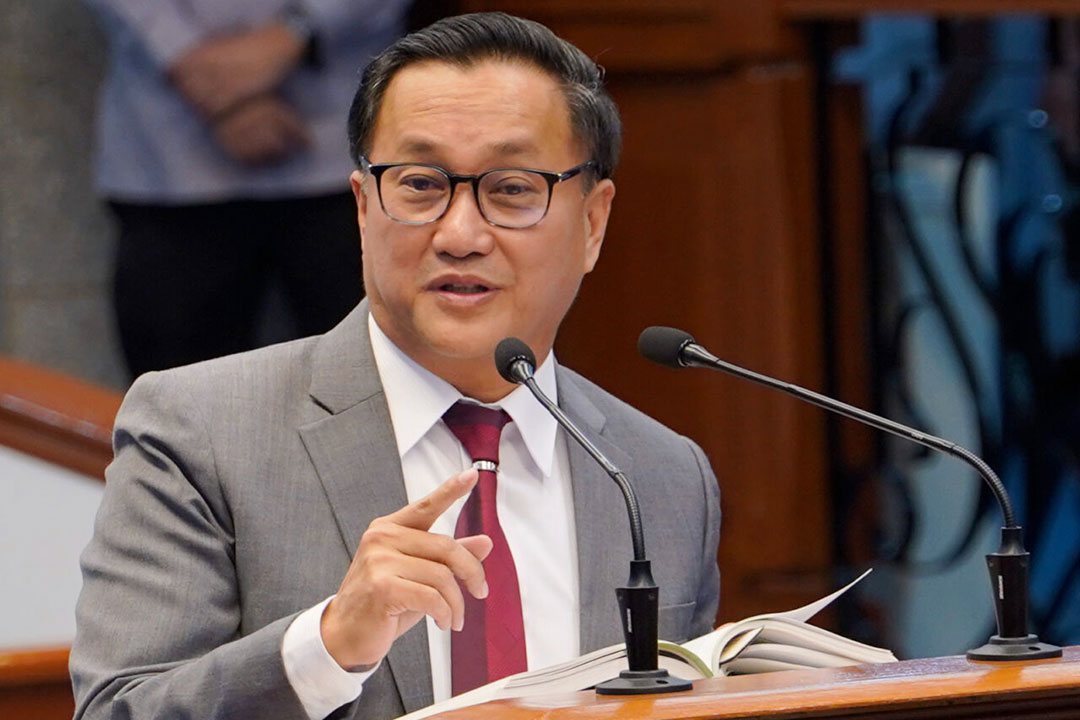Tolentino wants Chinese Embassy to take part in Senate investigation

By John Victor D. Ordoñez, Reporter
SENATOR Francis N. Tolentino urged the Chinese Embassy in Manila on Wednesday to participate in the Senate’s probe into the alleged wiretapped conversation between their diplomat and a Philippine military official on a supposed “new model” on handling tensions at the disputed Second Thomas Shoal.
“They (Chinese Embassy) cannot be compelled (to attend),” said Mr. Tolentino, who earlier filed a resolution seeking to investigate the alleged wiretapped conversation and disinformation drive allegedly launched by China.
Earlier, Beijing threatened to release the transcript and recordings of a conversation supposedly between a Filipino admiral and a Chinese diplomat about a new model agreed upon over the shoal in which the Philippines would deploy fewer vessels in resupply missions to its troops stationed there.
Citing possible violation of the Philippines’ Anti-Wiretapping Law (Republic Act No. 4200), Mr. Tolentino said: “But because this is a violation of Philippine laws, I think they (Chinese Embassy officials) should attend (the Senate probe) to ensure that they are (acting) in good faith, to prove that they are not hiding anything.”
The Chinese Embassy in Manila did not immediately respond to a Viber message seeking comment.
Mr. Tolentino said the Senate is likely to start its probe on the alleged disinformation by Chinese envoys about the arrangement in Second Thomas Shoal, which Manila calls Ayungin, on May 21.
If the Senate finds evidence of wiretapping during its investigation, he said the Philippine government could send the embassy’s non-diplomatic employees home, declare envoys persona non grata, and have the embassy downsized.
“What will happen is that we will really be asserting our right to implement our laws,” Mr. Tolentino said.
DEPORTATION LIKELY
In a Messenger chat with BusinessWorld, Center for International Law president Joel R. Butuyan said that if accusations against the Chinese diplomat are proven true, he or she would be deported.
However, the erring diplomat will not be facing charges because of diplomatic immunity.
Former Philippine Ambassador to Turkey and Laos Marilyn J. Alarilla said the Chinese envoy involved in the alleged wiretapping incident may be deported and declared persona non grata if the accusations are proven to be true.
“Diplomats are required to follow the laws of the receiving state. PH has an anti-wiretapping law. Hence, if the Chinese diplomat (who remains unnamed) recorded the conversation without the consent of [the naval officer], chief of the Western Command (WESCOM), then the Chinese diplomat violated the anti-wiretapping law (RA No. 4200),” she told BusinessWorld in a Messenger chat.
Ms. Alarilla, who also teaches Philippine Foreign Policy at De La Salle-College of St. Benilde, said the Filipino admiral would surely know the identity of the Chinese envoy in the purported conversation.
“The WESCOM chief was transferred to another post and there’s news that he will not be investigated,” she added.
On Tuesday, the Department of Justice (DoJ) ordered the National Bureau of Investigation (NBI) to investigate the alleged wiretapping of the conversation regarding Ayungin Shoal.
Justice Secretary Jesus Crispin C. Remulla said that diplomatic immunity is not absolute and is always regulated within the bounds of the law enforced by the receiving State.
“Diplomatic immunity should never be used as a license to exploit our country’s peace and harmony for selfish motives, this privilege does not anyone from the consequences of the Rule of Law,” he said.
Diplomats and their immediate family members are protected by varying degrees of immunity but only cover their official acts, as enshrined in the Vienna Convention on Diplomatic Relations.
Article 31 of the Convention says a diplomatic agent shall enjoy immunity from the criminal jurisdiction of the receiving State. He/she shall also enjoy immunity from its civil and administrative jurisdiction. — with a report from Chloe Mari A. Hufana



